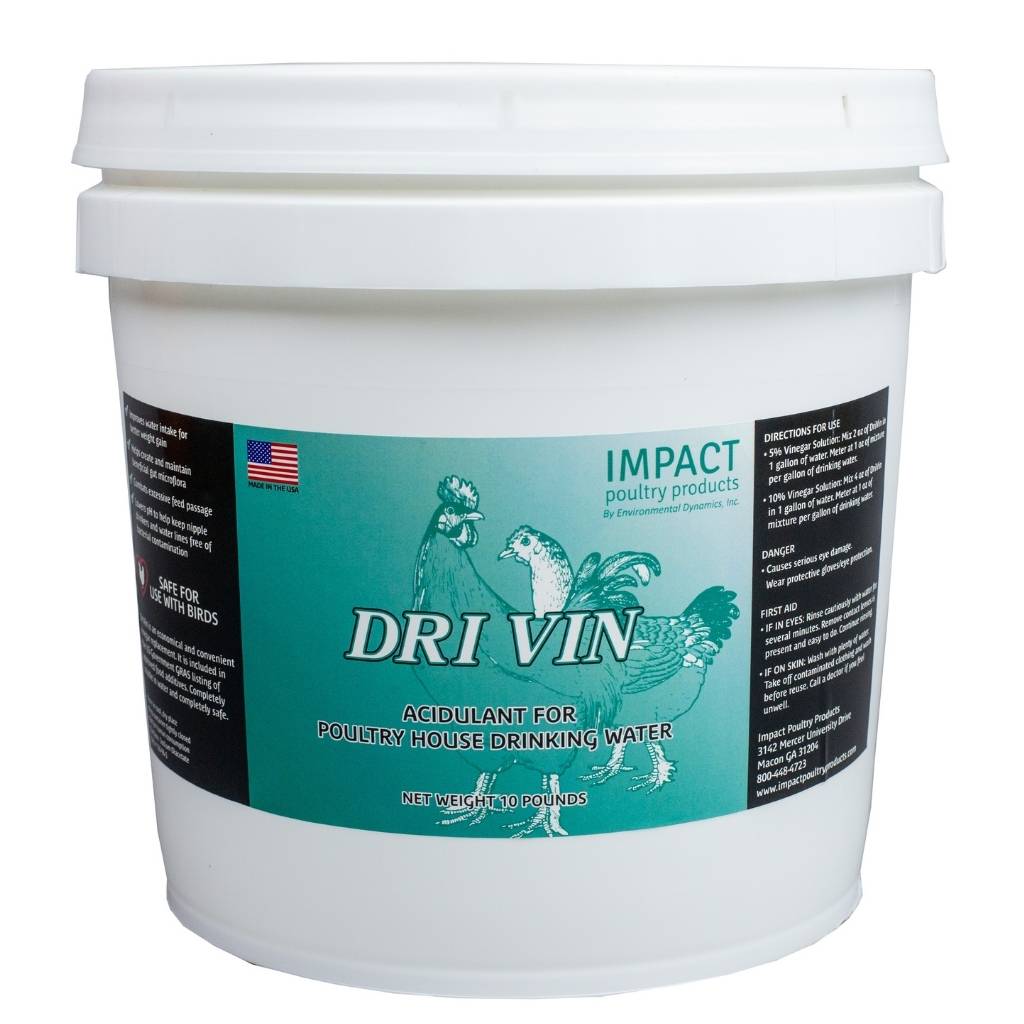DriVin

A convenient, dry-form vinegar replacement that acidifies drinking water to improve poultry health.
Encourages poultry to drink more water and has a positive effect on weight gain.
Lowers the pH in the intestinal tract to reduce bacteria that require an alkaline environment for optimum growth.
Helps keep drinking lines and nipples free of bacteria during growouts and can be used to clean drinker lines between flocks.
A Multi-Benefit Vinegar Replacement
Use DriVin as a Vinegar Replacement
Powerful, Safe, and Convenient.
DriVin replaces liquid vinegar with an easy-to-use dry formula. Its active ingredients—acetic acid and sodium acetate—are on the US Government’s GRAS (Generally Recognized As Safe) list of food additives, so you can trust it as a safe, proven choice for poultry operations.
Simple to Use as a Vinegar Replacement.
Mix 2 oz of DriVin per gallon of water to create a stock solution. Meter that solution at 1:128 (1 oz per gallon of drinking water) to deliver a consistent 5% acetic acid solution—without the mess or hassle of liquid vinegar.
Use DriVin to Manage Heat Stress
How to Use DriVin to Manage Heat Stress
Mix 8 oz of DriVin with 1 gallon of water to create a concentrated stock solution (40% acetic acid / 60% sodium acetate). Meter this solution at 1 oz per gallon of drinking water. At high concentrations, the sodium acetate in DriVin helps birds fight heat stress.
Why It Matters
When birds pant to cool down, they lose carbon dioxide through rapid breathing, a process known as hyperventilation. This raises blood and tissue alkalinity, a condition called respiratory alkalosis. DriVin’s ingredients metabolize into carbon dioxide and water inside chickens and turkeys, restoring CO2 levels and counteracting alkalosis.
Benefits for Layers and Broilers
For layers, maintaining CO2 is critical: they need it to form strong eggshells. Heat-stressed layers often lay fewer, smaller eggs with thinner shells. Broilers under heat stress may suffer more leg problems, slower weight gain, and higher mortality. DriVin helps protect both flocks from these costly challenges.
DriVin vs Electrolytes
Electrolytes vs. DriVin
Electrolytes replace salt, potassium, and bicarbonate lost through diarrhea or severe dehydration. They also help when birds face enteritis with diarrhea. While electrolytes may increase water intake, birds already drink enough during heat stress if they have access to plenty of drinkers. Because birds don’t sweat, they don’t lose electrolytes unless diarrhea occurs. Most importantly, electrolytes cannot correct the alkalosis caused by panting.
Why Alkalosis Matters
When birds pant to cool themselves, they exhale excessive carbon dioxide. This loss of CO₂ raises the pH of their blood and tissues, resulting in a condition known as respiratory alkalosis. Alkalosis disrupts the acid–base balance, interferes with normal metabolism, and reduces oxygen delivery to cells. In layers, alkalosis also reduces the carbonate available for eggshell formation, leading to thinner shells, fewer eggs, and smaller eggs. In broilers, alkalosis worsens heat stress effects—causing poor weight gain, weaker legs, and higher mortality.
The DriVin Advantage
DriVin goes beyond electrolytes. It not only encourages steady water consumption but also restores carbon dioxide levels by metabolizing to CO2 and water inside the bird. This directly combats alkalosis and protects both layers and broilers from heat-related losses.
The active ingredients in DriVin appear on the US Government’s GRAS (Generally Recognized As Safe) list of food additives. Birds metabolize them completely, leaving no residue behind. That makes DriVin both effective and safe for all poultry operations